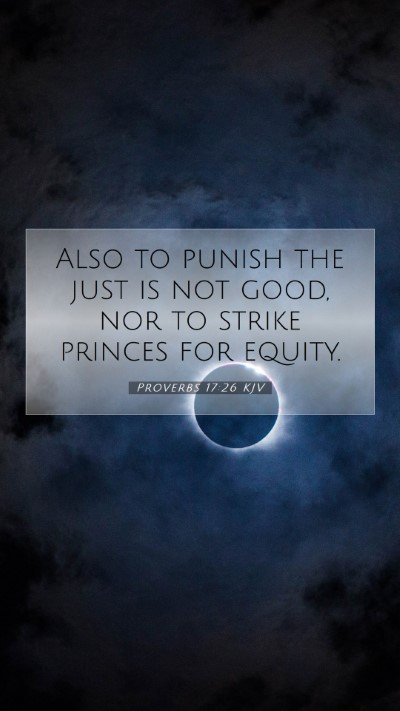Understanding Proverbs 17:26
Proverbs 17:26 states: "Also to punish the just is not good, nor to strike princes for equity." This verse highlights important themes about justice and the treatment of those who are in positions of authority and righteousness.
Bible Verse Meanings and Interpretations
The meaning of this Bible verse can be elaborated through various public domain commentaries, including those by Matthew Henry, Albert Barnes, and Adam Clarke.
Matthew Henry's Commentary
Matthew Henry emphasizes that this verse speaks to the injustice of punishing the righteous or just. He remarks that it is unwise and against divine justice to strike or punish those who are upright in character. True equity demands that the innocent be protected, and that the law should operate fairly without bias against goodness. According to Henry, a just ruler must recognize the value of justice in governance and avoid unjust actions that harm the innocent, which can lead to societal chaos.
Albert Barnes' Notes on the Bible
Albert Barnes explains that the verse stresses the importance of fairness in leadership. He notes that to punish the just not only goes against moral correctness but also undermines the principles of righteous governance. Barnes suggests that legitimacy in authority comes from just actions, and punishing the innocent only creates a breeding ground for corruption and disregard for the law. He adds that leaders should aim for equity, as striking down those who seek fairness serves no good purpose.
Adam Clarke's Commentary
Adam Clarke adds depth by asserting that this verse illustrates the relationship between moral leadership and the well-being of society. Clarke points out that both the just and the rulers should uphold integrity. He raises a point that striking princes, or leaders, for equity implies removing those who fail their duty in promoting justice. He infers that a society thrives when its leaders exercise caution and fairness, as these virtues are pivotal for maintaining order and justice.
Key Insights and Applications
- Importance of Justice: The verse underscores the need for justice in governance, warning against acts that negate righteousness.
- Accountability: Leaders must hold themselves accountable to God and humanity by ensuring that their decisions are free from biases and injustices.
- Societal Impact: The moral state of leaders greatly influences the community's harmony—impure punishments can lead to societal decline.
- Fairness in Leadership: The responsibilities of leadership come with the obligation to treat the just with care and respect, affirming that the same guidelines apply to both leaders and the led.
Related Bible Cross References
- Proverbs 21:15: "It is a joy to the just to do justice: but destruction shall be to the workers of iniquity." This verse reaffirms the happiness found in executing justice and the consequences of injustice.
- Isaiah 10:1-2: "Woe unto them that decree unrighteous decrees, and that write grievousness which they have prescribed." This emphasizes the dangers of unjust ruling and the negative effects it brings to society.
- Micah 6:8: "He hath shewed thee, O man, what is good; and what doth the Lord require of thee, but to do justly, and to love mercy, and to walk humbly with thy God?" This highlights God's expectation of justice and humility in His followers.
Conclusion
In summary, Proverbs 17:26 serves as a powerful reminder of the principles of justice and the proper conduct expected from those in authority. By understanding this verse through the insights from historical commentaries, individuals seeking deeper Bible verse meanings can apply these lessons in their daily lives. They remind leaders and followers alike of the inherent value of fairness and the significant consequences of deviating from it.
This commentary aids in a broader Bible study context, providing tools for individuals, Bible study groups, and online Bible study sessions to engage with and understand Scripture more profoundly. Whether through personal reflection or group discussions, the message embedded in Proverbs 17:26 enhances our approach to justice in both human relationships and divine understanding.


